
Pius XII. and Second World War
In post-war Europe, an anti-Catholic course often suited (one could even say anti-Christian, but the first term is more appropriate for our work). In Eastern Europe it was clear with the advent of the communist regime, in Western Europe it often hid from various atheistic forms to Freemasonry and liberalist conceptions. Therefore, it is not surprising that a lot of anti-Catholic literature (but also other forms of propaganda) was often created (and unfortunately still is created today), which is not very surprising, as the Catholic Church does not want to adapt to the degenerate morals of today's society).


